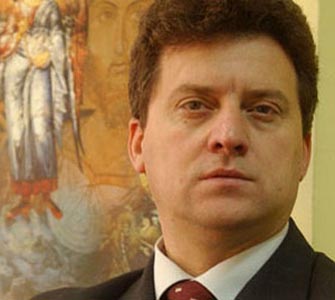Ivanov in strong lead in first Macedonia election round
 Skopje - The ruling party's presidential Georgi Ivanov took a convincing lead in the first round of Macedonia's elections Sunday, with twice the number of votes as his nearest rival in early vote results.
Skopje - The ruling party's presidential Georgi Ivanov took a convincing lead in the first round of Macedonia's elections Sunday, with twice the number of votes as his nearest rival in early vote results.
With 15 per cent of the ballots counted, Ivanov had 38.49 per cent, more than twice as much as his nearest rival. The turnout among the 1.8 million registered voters was 51.68 per cent, the election commission said.
The Social Democrats' candidate, Ljubomir Frckovski had 18.4 per cent and was closely followed by the independent runner and controversial former interior minister Ljube Boskoski, with 17.3 per cent, the commission said.
The run-off is set for April 5. The election commission did not say when they would announce definitive results of the first round, since they only counted ballots as they arrived and did not use a sample to project the figures early.
Ivanov is the candidate of nationalist Prime Minister Nikola Gruevski's ruling VMRO-DPMNE party.
Boskoski was tried and acquitted by the United Nations war crimes tribunal in 2005-2007 for his role as inrterior minister in a 2002 killing of alleged terrorists in the wake of an ethnic Albanian insurgency.
Mayoral and local elections were also held Sunday, but for Macedonia the fact that the elections passed without incident was almost more important than the outcome of the polls.
While gunfights and other violations marred election day last June, on Sunday only poor weather interfered with regular voting. Heavy snowfall since Friday prevented officials from reaching 93 remote villages, where polling stations never opened.
That would however not influence the regularity of the polls, in which Macedonians voted for president, 85 mayors and thousands of municipal legislators.
Neither the 300 or so observers from Organization for Security and Cooperation in Europe (OSCE), nor the more than 10,000 local monitors dispatched to the 2,600 polling stations reported major problems or violations.
Macedonian politicians hope a well-organized election may help Skopje unfreeze its approach to European Union membership, after little happened since it was formally named a candidate in 2005.
A spotty election record, lagging reforms and corruption muddled the country's EU outlook, while a diplomatic row with Greece over the name Macedonia cost it an invitation to join NATO a year ago. (dpa)